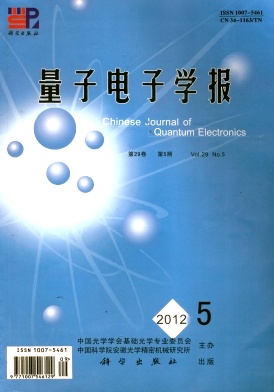通过六比特最大纠缠态来分裂量子信息
[1] Bennett C H, Brassard G, Crepeau C, et al. Teleporting an unknown quantum state via dual classical and Einstein-Podolsky-Rosen channels [J]. Phys. Rev. Lett., 1993, 70(13): 1895-1899.
[2] Zha Xinwei, Ren Kuanfang. General relation between the transformation operator and an invariant under stochastic local operations and classical communication in quantum teleportation [J]. Phys. Rev. A, 2008, 77: 014306-014309.
[3] Zha Xinwei, Song Haiyang, Ren Kuanfang. The relation between local unitary transformation invariant and perfect quantum teleportation [J]. IJQI, 2010, 8(8): 1251-1256.
[4] Bennett C H, et al. Communication via one- and two-particle operators on Einstein-Podolsky-Rosen states [J]. Phys. Rev. Lett., 1992, 69: 2881-2884.
[5] Hillery M, Buzek V, Berthiaume A. Quantum secret sharing [J]. Phys. Rev. A, 1999, 59: 1829-1834.
[6] Zhang Dengyu, Tang Shiqing, Wang Xinwen, et al. A simple scheme for realizing four-photon GHZ state based on cavity quantum electrodynamics [J]. Chinese Journal of Quantum Electronics (量子电子学报), 2012, 29(2): 193-195 (in Chinese).
[7] Tang Shiqing, Zhang Dengyu, Gao Feng, et al. Scheme for implementing a three-qubit Toffoli gate resonant interaction in bimode cavity QED system [J]. Chinese Journal of Quantum Electronics (量子电子学报), 2009, 2(5): 548-554 (in Chinese).
[8] Zhan Xiaogui, Zhang Dengyu, Gao Feng, et al. Controlled teleportation of an arbitrary two-qubit superposition state [J]. Chinese Journal of Quantum Electronics (量子电子学报), 2009, 2(1): 44-49 (in Chinese).
[9] Scherpelz P, Resch R, Berryrieser D, et al. Entanglement-secured single-qubit quantum secret sharing [J]. Phys. Rev. A, 2011, 84: 032303.
[10] Gottesman D. Theory of quantum secret sharing [J]. Phys. Rev. A, 2000, 61: 042311.
[11] Cleve R, Gottesman D, Lo H K. How to share a quantum secret [J]. Phys. Rev. Lett., 1999, 83: 648.
[12] Lance A M, et al. Tripartite quantum state sharing [J]. Phys. Rev. Lett., 2004, 92: 177903.
[13] Zhang Zhanjun, Li Yong, Man Zhongxiao, et al. Multiparty quantum secret sharing [J]. Phys. Rev. A, 2005, 71: 044301.
[14] Singh S K, Srikanth R. Generalized quantum secret sharing [J]. Phys. Rev. A, 2005, 71: 012328.
[15] Deng Fuguo, Li Xihan, Li Chunyan, et al. Multiparty quantum-state sharing of an arbitrary two-particle state with Einstein-Podolsky-Rosen pairs [J]. Phys. Rev. A, 2005, 72: 044301.
[16] Gordon G, Rigolin G. Generalized quantum-state sharing [J]. Phys. Rev. A, 2006, 73: 062316.
[17] Zheng Shibiao. Splitting quantum information via W states [J]. Phys. Rev. A, 2006, 74: 054303.
[18] Muralidharan S, Panigrahi P K. Quantum-information splitting using multipartite cluster states [J]. Phys. Rev. A, 2008, 78: 032321.
[19] Zhan Youbang, Zhang Qunyong, Wang Yuwu. Schemes for splitting quantum information with four-particle genuine entangled states [J]. Commun. Theor. Phys., 2010, 53: 847.
[20] Wang Xinwen, Xia Lixin, Wang Zhiyong, et al. Hierarchical quantum-information splitting [J]. Opt. Commun., 2010, 283: 1196.
[21] Borras A, Plastino A R, et al. Multiqubit systems: highly entangled states and entanglement distribution [J]. Phys. A: Math. Theor., 2007, 40.
[22] Zha Xinwei, Song Haiyang. Two schemes of remote preparation of a four-particle entangled W state via a six-qubit maximally entangled state [J]. Phys. Scr., 2011, 84: 015010.
[23] Zha Xinwei, Song Haiyang. Remote preparation of a two-particle state using a four-qubit cluster state [J]. Opt. Commun., 2011, 284: 1472-1474.
[24] Zha Xinwei, Song Haiyang. Optimal schemes of teleportation one-particle state by a three-particle general W state [J]. Commun. Theor. Phys., 2010, 53(5): 852-854.
[25] Zha Xinwei, Song Haiyang. Teleportation and controlled teleportation with maximally four-qubit entanglement quantum states [J]. Mod. Phys. Lett. B, 2010, 24(19): 2069-2076.
涂修丽, 张婷, 王先明, 徐晶. 通过六比特最大纠缠态来分裂量子信息[J]. 量子电子学报, 2012, 29(5): 577. TU Xiu-li, ZHANG Ting, WANG Xian-ming, XU Jing. Splitting quantum information via six-qubit maximally entangled state[J]. Chinese Journal of Quantum Electronics, 2012, 29(5): 577.




